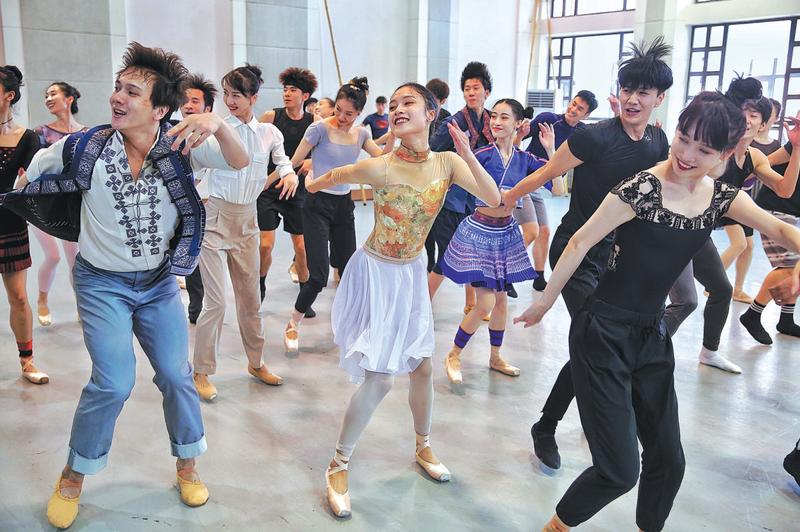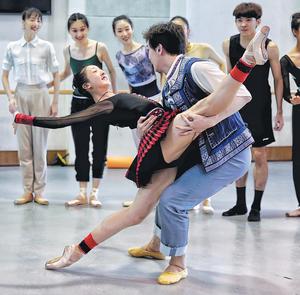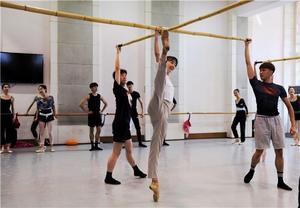The National Ballet of China will debut a piece that infuses such dimensions of Miao culture as traditional ethnic dances, Chen Nan reports.
 Performers rehearse a new ballet piece, Like Flowers, which will premiere on Sept 11 at the National Center for the Performing Arts in Beijing. Ethnic Miao folk dances and costumes are infused with ballet in the performance. (JIANG DONG / CHINA DAILY)
Performers rehearse a new ballet piece, Like Flowers, which will premiere on Sept 11 at the National Center for the Performing Arts in Beijing. Ethnic Miao folk dances and costumes are infused with ballet in the performance. (JIANG DONG / CHINA DAILY)
The National Ballet of China has announced its latest original piece, Like Flowers, will premiere on Sept 11 at the National Center for the Performing Arts in Beijing and will run at the venue until Sept 13.
The production choreographed by Fei Bo and Zhang Zhenxin follows the story of volunteer He Lin, who travels to a remote mountainous area inhabited by ethnic Miao people and devotes himself to China's poverty alleviation campaign. Miao folk dances and costumes are infused with ballet in the performance.
"I've been traveling to Guizhou province and Hunan province's Xiangxi Tujia and Miao autonomous prefecture, where Miao people live," says Zhang, the choreographer who graduated from the Beijing Dance Academy in 2007 and joined the National Ballet of China the same year.
"It has long been a wish of mine to combine ethnic Miao dance with ballet."
 (JIANG DONG / CHINA DAILY)
(JIANG DONG / CHINA DAILY)
The company planned to create Like Flowers since the end of last year. But COVID-19 disrupted the plan.
The two choreographers started to work on the new piece in early February, after the dancers had resumed their daily training from their homes across the country.
"Usually, we'd prepare for a new piece together in a rehearsal room," says Fei, a veteran dancer-choreographer with the company, who's known for choreographing such pieces as Dunhuang and The Peony Pavilion.
"It was a big challenge for all of us because we had to create a new piece starting from zero without seeing one another. I was in Beijing, and Zhang Zhenxin lived in Ningbo (Zhejiang province), some 1,300 kilometers away. We made lots of phone calls to discuss the piece."
The company's ballet dancers, including Ma Xiaodong, Qiu Yunting and Wang Ye, will play major roles. And the company's symphony orchestra will play under the baton of chief conductor Zhang Yi.
 (JIANG DONG / CHINA DAILY)
(JIANG DONG / CHINA DAILY)
With the help of folk-dance experts, such as the China Ethnic Song and Dance Ensemble's former director Ding Wei, and composer Wang Danhong, who also works with the ensemble, National Ballet of China dancers learned the movements of Miao folk dances from their homes through online courses and videos.
"Ballet and Miao dances are totally different dance languages, in terms of techniques and poses. Dancers have to make changes during their performances, which isn't easy," says Fei.
For example, in several scenes, bamboo dancing, a traditional activity to mark Miao celebrations, is performed by ballet dancers, who jump while dancing on their pointe shoes.
The performance also incorporates intangible cultural heritage in the form of Miao embroidery, which is used in products sold to lift people out of poverty.
National Ballet of China's president Feng Ying says poverty alleviation not only means helping people to enjoy better living conditions but also is about living lives full of hope and passion.
"We've performed in remote villages throughout China, and we've seen how people work hard to change their situations. The country will achieve xiaokang, or a moderately prosperous society in all respects, by the end of 2020. The new piece comes at the right time," she says.
"We've been trying to create original ballet pieces that are fused with Chinese stories and traditions, such as The Red Detachment of Women, Raise the Red Lantern and Dunhuang. This is the first time that the company has debuted a work centered on the Miao ethnic group, which is exciting."
Contact the writer at chennan@chinadaily.com.cn


